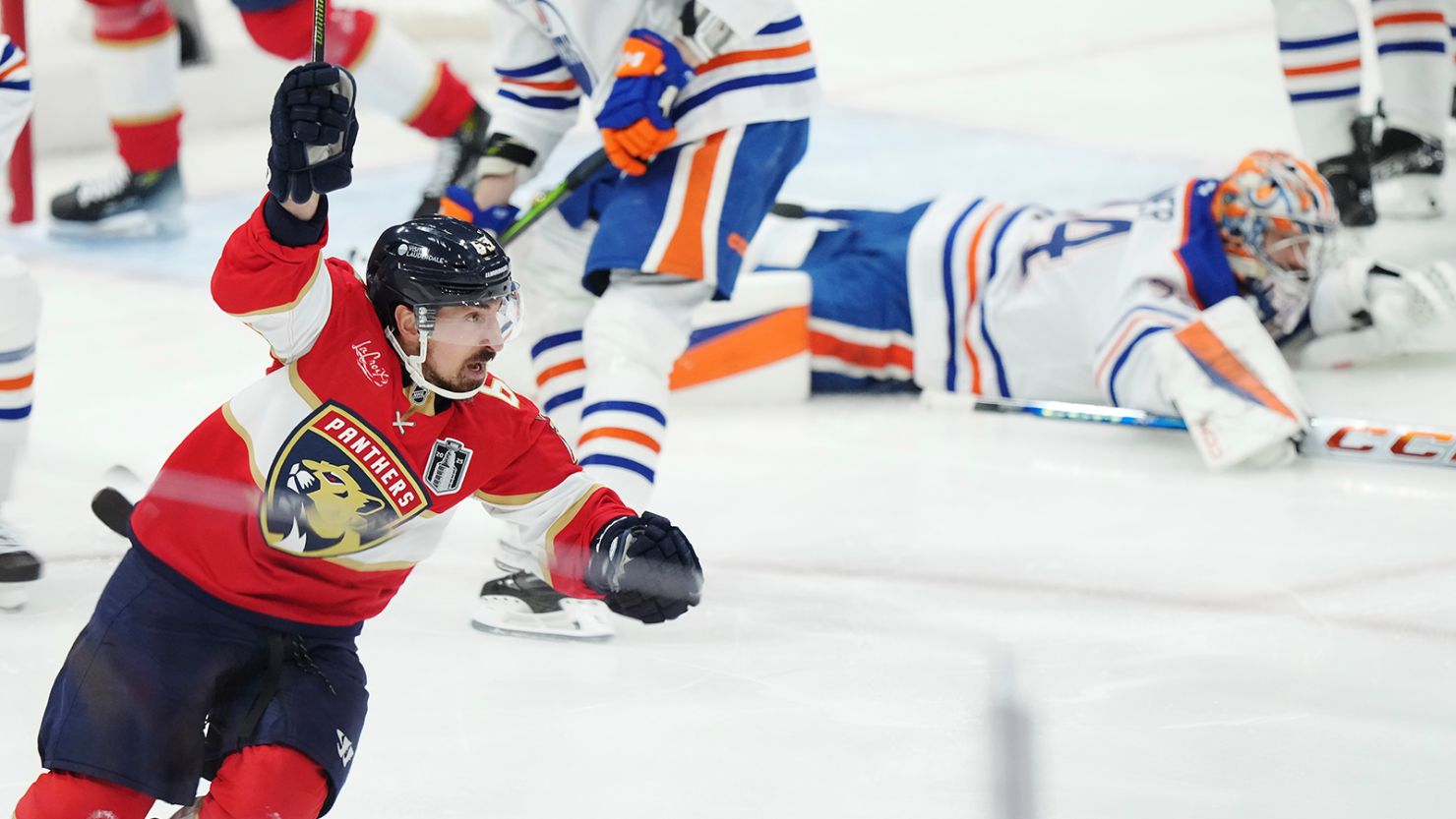Count to eleven. One. Two. … Eleven. That`s the number of times the Florida Panthers have reached the five-goal mark in a single game this postseason. They did it twice against Tampa Bay, three times against Toronto, four against Carolina, and now twice in a row against the Edmonton Oilers after a commanding 6-1 victory in Game 3 of the Stanley Cup Final.
High-scoring games are characteristic of the Panthers, but allowing more than five goals in a playoff game is unusual for the Oilers. Before Game 2, they hadn`t conceded that many since Game 1 of the Western Conference Final.
With the Panthers now leading the series 2-1, the defending champions are just two wins away from hoisting the Stanley Cup again. Here`s a look at how Game 3 unfolded, who to watch next, and the key questions facing each team heading into Game 4.

Florida Panthers
Grade: A+
Florida outplayed Edmonton in every aspect of Game 3. They demonstrated superior effort and execution at both even strength and on special teams. The Panthers` forecheck was relentless, they consistently won battles along the boards, and critically, they effectively neutralized Edmonton`s star players and overall offense. Goaltender Sergei Bobrovsky delivered a sensational performance, significantly outshining Stuart Skinner.
Florida established control early with Brad Marchand scoring less than a minute into the game. Their power play also clicked, with Carter Verhaeghe finding the net on their fourth opportunity of the first period. Sam Reinhart`s quick response to Corey Perry`s goal for Edmonton in the second period, followed by Sam Bennett`s breakaway goal, solidified Florida`s focused performance.
Holding a 4-1 lead going into the third period, coupled with their impressive 30-1 postseason record under coach Paul Maurice when leading after two frames, gave the Panthers all the confidence they needed. This allowed them to not only chase Skinner from the game but also cruise to a decisive victory.

Edmonton Oilers
Grade: D
The Oilers once again suffered from a slow start, conceding two goals in the first period – a recurring issue this series. They struggled to maintain puck possession and were plagued by turnovers leading directly to goals. Aside from Corey Perry`s goal, set up by Evan Bouchard, Edmonton`s supporting players failed to make a significant impact, in stark contrast to Florida`s six different goal scorers.
Edmonton also struggled with discipline, accumulating 85 penalty minutes, the most in a Cup Final game since 1986. While the first two games could have gone either way, Game 3 saw the Oilers falter in numerous areas. Although they`ve been known for playoff comebacks, facing a three-goal deficit heading into the third period of a Cup Final game presented an almost insurmountable challenge; the last time a team overcame such a deficit in the third of a Final game was in 1944. After allowing a power-play goal early in the third, Stuart Skinner was replaced by Calvin Pickard.
These collective challenges resulted in the Oilers` poorest showing of the Cup Final, perhaps their weakest performance since the early stages of the first round against the Los Angeles Kings.
Game 3 Standouts
Here are three key elements that stood out in Game 3:

1. Sam Reinhart, F, Panthers
Reinhart recorded his first points of the Cup Final with a goal and an assist, timing it perfectly. The team that wins Game 3 in a tied Cup Final series goes on to win the championship approximately 76% of the time.

2. Paul Maurice, Panthers Coach
The Panthers coach celebrated his 1,000th NHL win. His strategic decisions proved perfect as his team secured a decisive 6-1 victory.
3. The Penalty Box
A frequently visited spot throughout Game 3. The two teams combined for a total of 140 penalty minutes, ranking as the fourth-highest total in Cup Final history. The record stands at 176 minutes from a game in 1986.
Players to Watch in Game 4

Aleksander Barkov, C, Panthers
The Panthers` captain has yet to register a point in the Cup Final, with only six shots on goal. While he`s logging significant minutes, including over 30 in the double-overtime Game 2, and tasked with containing Edmonton`s top line, his lack of offensive production is noticeable.
Barkov was a consistent offensive force through the first three playoff rounds, scoring six goals and adding 11 assists. Something hasn`t translated for him in the Final; he`s appeared slightly off his usual pace.
This dry spell is unlikely to last. Barkov is too skilled not to become a key offensive contributor for Florida. If he breaks out, it could spell further trouble for Edmonton, especially considering the Panthers` offensive outburst in Game 3 even without his points.

Stuart Skinner, G, Oilers
The spotlight is back on the Oilers goaltender. Game 3 marked the fourth time this postseason Skinner has allowed five or more goals. The second instance led to him being replaced by Calvin Pickard in the first round, and Pickard stepped in again in Game 3, stopping seven of eight shots after Skinner`s exit. The most recent time Skinner allowed over five goals, the Oilers rallied to win four straight to reach the Final.
However, how much of Game 3`s outcome falls on Skinner? The Oilers committed 11 giveaways, gave the Panthers seven power-play chances, and continued to allow two unanswered goals within periods. Was Skinner the primary issue, or was he let down by the defensive structure and team performance around him?
Big Questions for Game 4

Can the Panthers maintain their containment of Connor McDavid and Leon Draisaitl?
Florida executed an excellent plan to neutralize McDavid and Draisaitl at 5-on-5 and on the power play. Even when Edmonton coach Kris Knoblauch paired them together mid-game hoping for a spark, it didn`t significantly improve their impact.
Draisaitl had zero shot attempts early in the third period, and McDavid had only two. While Bobrovsky was outstanding, Edmonton`s stars struggled to generate many high-danger opportunities in front of him. By the end of the game, given the team`s collapse, Knoblauch might have considered limiting their ice time altogether.
Whatever strategy Florida employed to limit Edmonton`s top offensive threats in Game 3 needs to be replicated in Game 4. The Oilers made Barkov uncomfortable when they controlled matchups, but at home, the Panthers successfully stifled Edmonton`s two best players. If Florida can repeat that defensive effort, they have a strong chance to take a commanding series lead before the series returns to Edmonton.

Can the Oilers fix their recent defensive structure issues?
Breakaway goals have been a significant problem for Edmonton. Brad Marchand scored one to get Florida on the board in Game 2 and another in double overtime to win it. Sam Reinhart also had a breakaway opportunity in the first overtime that could have ended the game.
Allowing three goals halfway through Game 3 already raised questions about the Oilers` defensive scheme. Sam Bennett`s breakaway goal that made it 4-1 in the second period highlighted further concerns.
The Oilers have given up control in stretches, with the Panthers sometimes holding over 65% of the shot share. They have also allowed two unanswered goals in a period six times across the first nine periods of the series. Establishing consistent defensive play was a hallmark for the Oilers earlier this postseason. However, a lack of defensive consistency in the Final has contributed significantly to them falling into a 2-1 series deficit.

